The following stories were posted on the Bob’s Local Reporting webpage with datelines during October 2019:
Good Bye; Good Riddance
Sad House, Crumbling at the Heart of Enfield Center, Finally Bites the Dust
by Robert Lynch, October 22, 2019
Call it Enfield Center’s yellow eyesore. Call it one family’s personal misfortune. But at least—and at last—you can now call Sad House history!
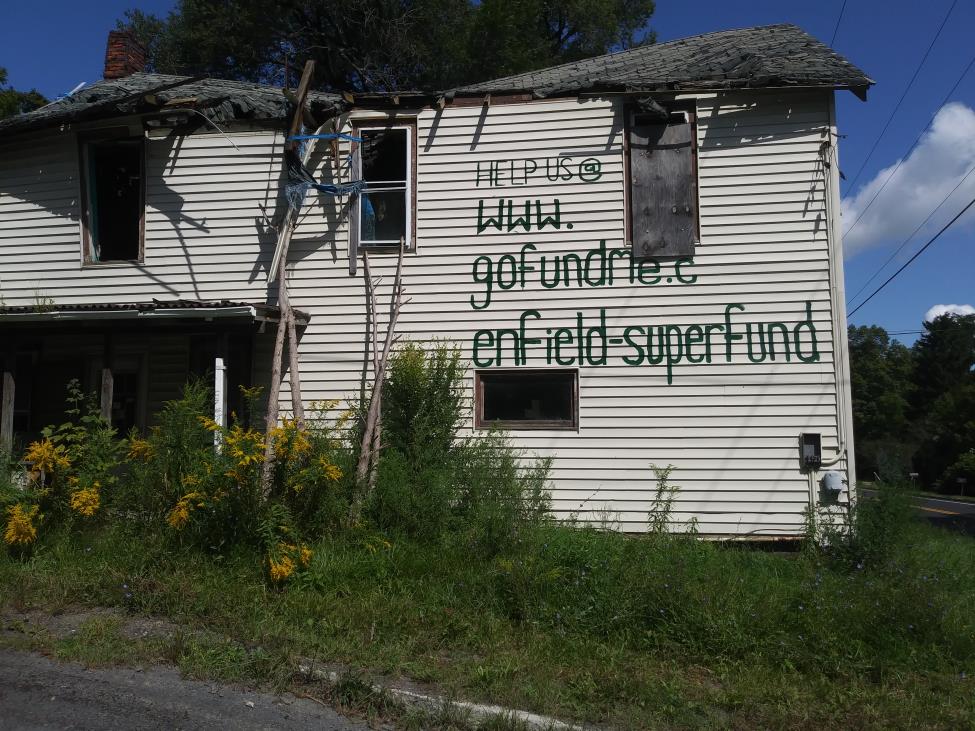
August 29th
Monday (Oct.21st), a professional wrecking crane demolished the condemned, crumbling former home and beauty shop, which has been falling into itself—and out toward the road—at the northwest corner of Enfield Main and Enfield Center Roads.
The two-story frame building, unsafe to enter and condemned for more than a year, had already lost part of its roof to Mother Nature before a claw-mounted crane began digging into its facade Monday morning.
Demolition took about eight hours that first day. By late Tuesday morning, most the debris had been removed, loaded into industrial dumpsters for transport to a landfill to be disposed as hazardous waste.
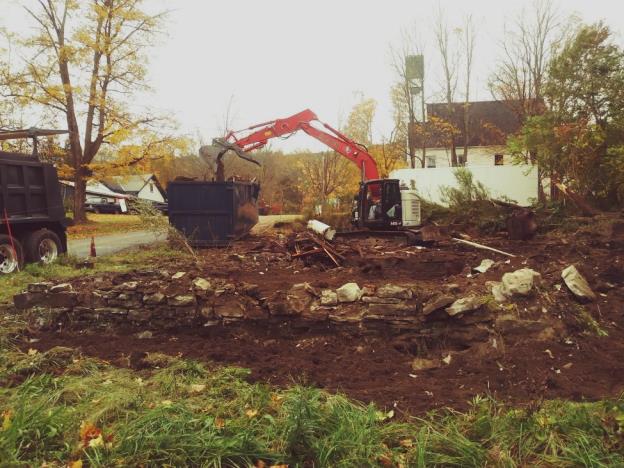
Earlier detection of minor amounts of asbestos in the building’s flooring and plaster required a much more expensive demolition than the building’s owners had first expected. Co-owner Lois Gallegos had most recently estimated that the asbestos-sensitive razing would cost her family approximately $34,000.
During demolition and debris removal, numerous asbestos monitors had been placed around the demolition site’s taped-off perimeter. Roswell Timmerman, an on-site engineer for Rochester-based ENVOY Environmental Consultants, said Tuesday that all monitors “passed” after Monday’s demolition, meaning that the monitors indicated no asbestos particles had escaped into the air outside the off-limits perimeter during Day One. Second-day monitoring data had yet to be processed.
The saga of what arguably has become one Enfield family’s personal financial hardship began in mid-2018, when couple Andres and Lois Gallegos, who reside in the adjacent converted church at 7 Enfield Center Road West, bought 198 Enfield Main Road for just $500. They’d intended to demolish the dilapidated structure and use its site for a garage. Complications arose when consultants advised the Gallegos’ that minor amounts of asbestos in the floor and wall plaster would require a “controlled demolition” under rigid rules dictated by the New York State Department of Labor.
A prior owner. Heather Benedict, had offered to donate the parcel to the Town of Enfield if it would underwrite demolition. In August 2017, the Town Board rejected Benedict’s offer.
Similarly, the Board cast aside a renewed initiative this past spring which would have had the Town assume ownership.
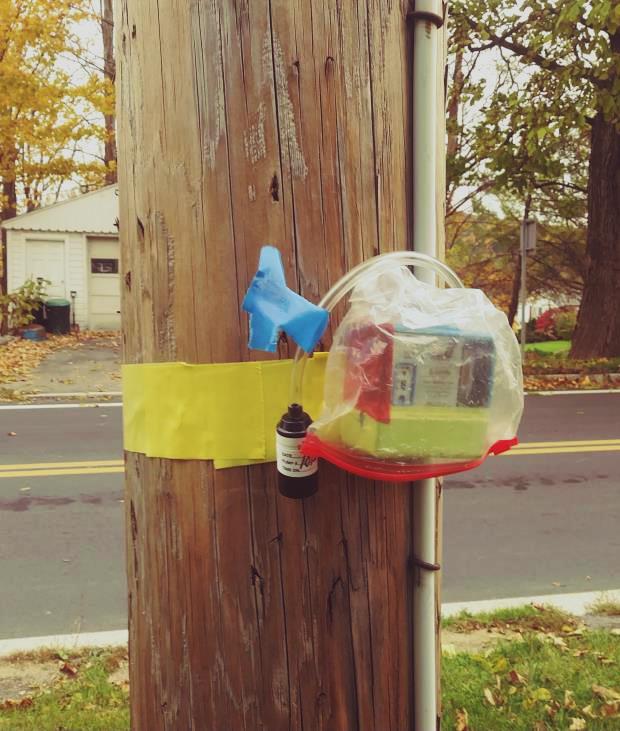
Over the summer, Lois Gallegos initiated a GoFundMe drive to raise community donations to help finance demolition. Gallegos set a funding goal of $25,000. By early September, the “Enfield Superfund,” according to its webpage, had raised only $185. That same funding total appeared on the Superfund’s page today.
Gallegos said in September that a personal home equity line of credit would underwrite the remaining expense.
On June 20th, at the Town Board’s direction, Enfield Code Enforcement Officer Alan Teeter issued the Gallegos’ a Notice of Violation and Order of Remedy, the most serious citation readily available to the Enfield Town. Teeter said the notice could, if enforced, require the owners to pay fines of up to $1000 per day or incur jail time for the owner should a judge impose it.
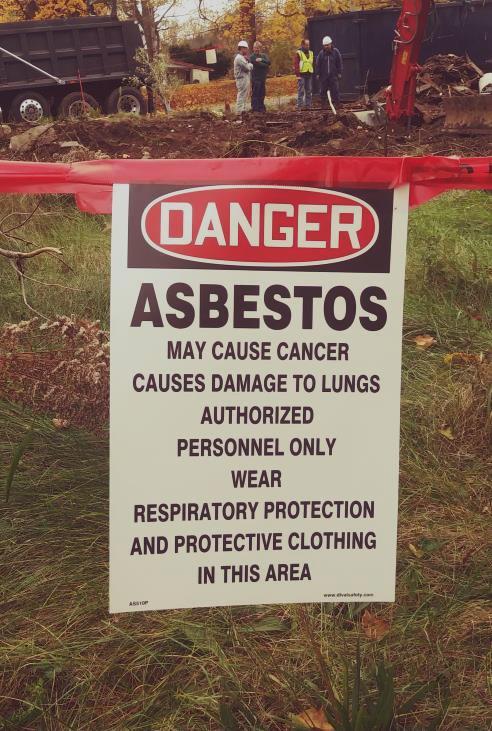
The Notice of Violation was never enforced. Rather, after the Gallegos’ retained demolition contractor Expert Environmental and Construction Group, Teeter signed a demolition permit September 19th. Teeter was on the site this morning, assuring the contractor’s compliance with Town standards.
During demolition and debris clean-up, caution signs hanging from red tape around the site warned that because of the cancer-causing asbestos risk, all personnel within the perimeter were required to wear “respiratory protection and protective clothing.” Nonetheless, as was confirmed on-site by engineer Timmerman, demolition personnel, including the crane’s operator, were dressed normally and were not using respirators.
###
Enfield Board poised to raid Town Hall moneys for salt shed
by Robert Lynch, October 22, 2019
A New Town Hall, on the wish list for some in Enfield politics for many years, is unlikely to happen anytime soon, Enfield Town Board members made clear Tuesday night (Oct. 22).
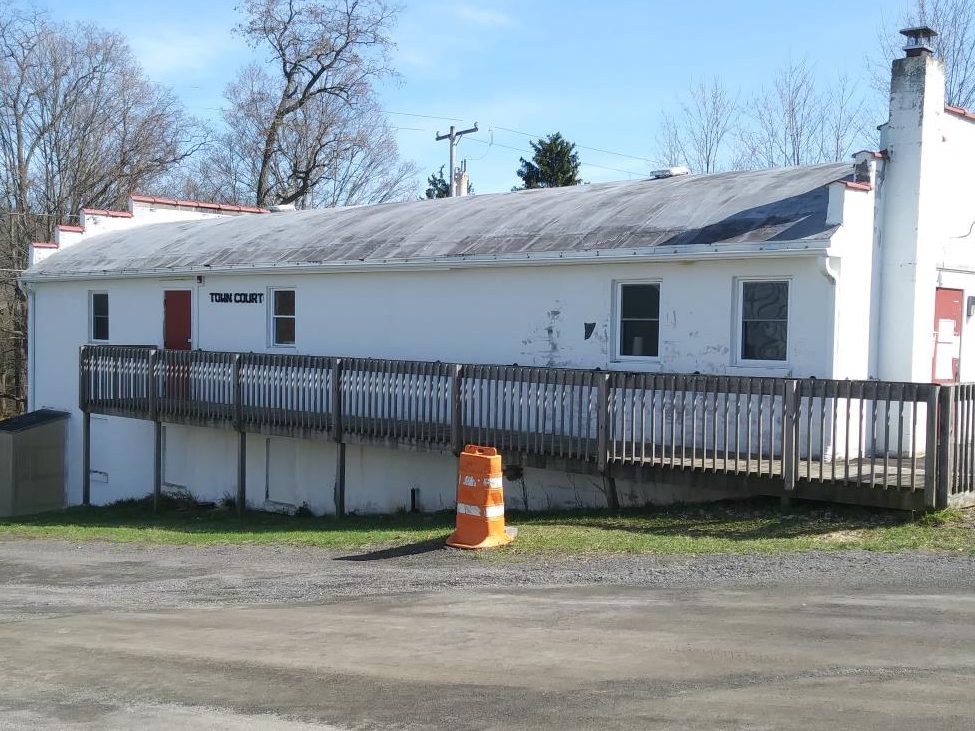
As part of a ten-year Capital Plan presented by Town Supervisor Beth McGee and generally embraced by her Town Board colleagues Tuesday, the Town would deplete nearly $74,000 stored within a fund labeled “Town Hall Reserve.” It would reallocate the money toward the cost of a new salt storage building for the Highway Department.
Discussion of the proposed reallocation occurred as the Town Board unanimously (Councilperson Michael Carpenter was absent), approved a 2020 Preliminary Budget that would raise the overall tax levy by more than $71,000, but keep the proposed tax increase beneath the State’s property tax cap.
Under the Preliminary Budget, elevated by the Board from the Tentative Budget proposed last month by the Supervisor, the combined tax levy for the General Fund, Highway Fund, and the Fire Protection District would total approximately $1,868,000, based on this reporter’s interpolation of prior calculations. The levy’s total is just less than $3,400 over McGee’s initial submission. The change resulted from several minor spending adjustments.
Under the Preliminary Budget, the total tax collected would rise by 3.97 per cent, an increase slightly beneath the State’s largely-symbolic 4.16 per cent property tax cap announced in August. The Town Board, by a super-majority, has already agreed to override the cap, if necessary.
Enfield’s Preliminary Budget will face its required Public Hearing November 6th.
The Board embedded discussion of raiding the “Town Hall Reserve” within its broader review of McGee’s envisioned 10-year Capital Plan, a 13-page document which would guide Enfield’s spending on major-ticket items and direct Town fiscal policy in funding them.
(Specifics of the Capital Plan will be detailed here at a later date.)
The Enfield Board has made construction of a salt storage facility a priority, but has agonized over the structure’s funding. The Capital Plan estimates the shed would cost the Town “from $400,000 to $700,000 depending upon the materials and contractor used.”
Though the State has granted more than $340,000 toward the shed’s construction, Enfield taxpayers would still need to pick up half the tab. Board members are eyeing the Town Hall money, along with potential borrowing, to soften the blow on taxpayers.
Board members made it evident Tuesday they think a New Town Hall is many years off. The salt shed is far more immediate.
“It will save us money to spend it on the salt storage,” remarked Councilperson Mimi Mehaffey. “We’d best spend it sooner rather than later,” she added.
“It’s absurd to levy the funds if the money’s sitting there,” answered Councilperson Becky Sims.
Supervisor McGee agreed.
“It’s the wisest use of the money,” McGee said. “We have building needs. This is a building need. This should come first.”
Environmental concerns have motivated the Enfield Board to build the salt storage building. Members fear salt left uncovered will leech into Enfield Creek and an Aquifer just 14 feet underground.
McGee’s Capital Plan cautions reallocation of the Town Hall Reserve would be subject to a referendum. Members were unsure Tuesday whether the referendum would be mandatory or triggered only by citizen petitions. McGee speculated the referendum might be delayed until November 2020.
Nonetheless, Board members conceded their existing buildings, including the current Town Hall/Old Highway Barn complex; as well as their current meeting space, the Enfield Community Building, won’t last forever.
“There’s no way you’re going to get 20 more years out of these buildings, Sims cautioned.
###
Roof leak could complicate Sheriff’s Enfield plans
by Robert Lynch, October 17, 2019
Should the Tompkins County Sheriff locate a satellite substation at the Old Enfield Highway Barn, his deputies may find themselves singing “Raindrops Keep Fallin’ On My Head.”
Enfield Town Board members were advised Wednesday (Oct. 16th) that the aging roof covering the old barn’s five equipment bays has begun to leak. One day later, following a meeting of a County legislative committee which discussed the satellite station plans, Sheriff Derek Osborne acknowledged the need for repairs could delay his Department’s arrival to Enfield.
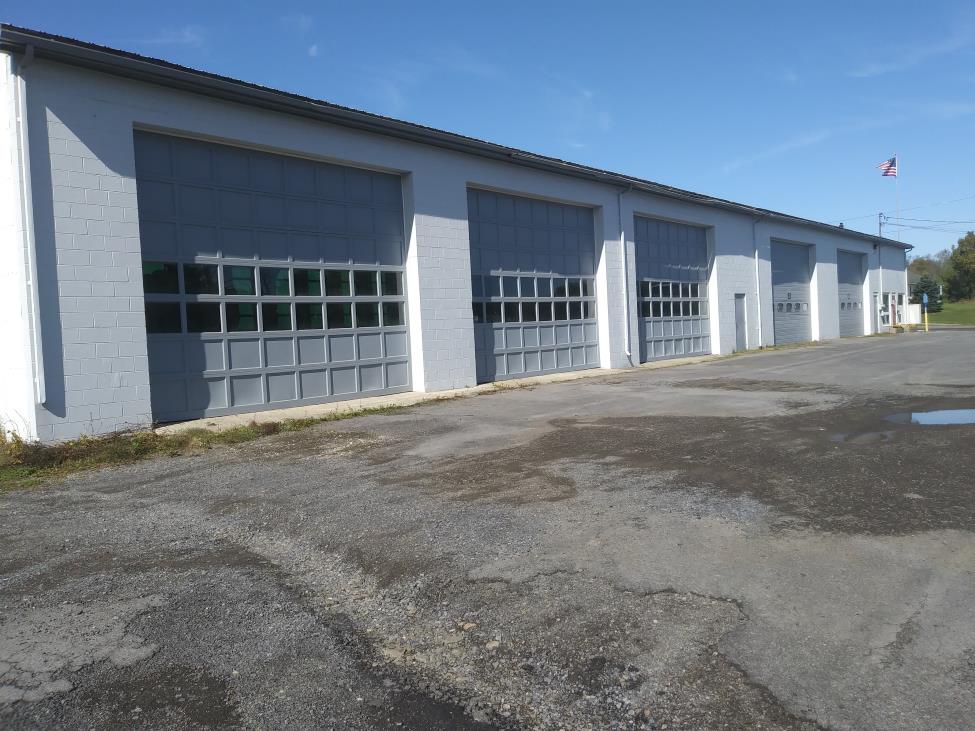
In late-September, Supervisor Beth McGee and her husband, Darren, himself a candidate for Enfield Councilperson, presented first the County’s Public Safety Committee, and then their own Town Board, a proposal to establish a part-time Sheriff’s patrol outpost within the old highway facility. Supervisor McGee has since set an informal public hearing on the proposal for November 6th, with a formal Town Board endorsement expected to follow one week later.
When the McGee’s unveiled their proposal, they never discussed roof issues. Instead, the Supervisor projected only minimal necessary upgrades relating to lighting, a security door, and window replacement. McGee projected they’d cost no more than $5,000. In a subsequent media report, she’d raised the estimate to $6,000.
Revelation of the Old Highway Barn’s leaky roof arose Wednesday during the Town Board’s budget deliberations. Town officials did not detail the extent of roof damage nor estimate repair cost. However, one official confirmed that the leaks do occur over that portion of the bays where the deputies’ patrol car would be parked.
Built in 1964, the Old Highway Barn has been used primarily for storage since Enfield moved into its current Highway Facility in 2011. Town Clerk Alice Linton advised the Board Wednesday that the leaks do not extend to where Town offices are located.
Thursday (Oct. 17th), as the Legislature’s Public Safety Committee again discussed the satellite substation, Enfield Councilperson candidate Robert Lynch (this writer) requested the County consider assisting Enfield’s government in funding the roof repairs. “New roofs ain’t cheap,” he said.
Lynch called the concept of an Enfield Sheriff’s satellite station “a No-Brainer.,” bringing prospective benefits “so simple,” and “so advantageous.” Yet noting that the Legislature has budgeted $20-22 Million for a Downtown Office Complex, Lynch suggested assisting Enfield would, by comparison, cost little.
“Perhaps you could scrape up just a few thousand more, just to keep raindrops from falling on one Sheriff’s patrol car,” Lynch remarked.
Supervisor McGee, who also attended Thursday’s meeting, did not ask for County assistance, nor did she respond to Lynch’s appeal. McGee did state that her Town hasn’t asked the County “for any rent for the station.”
When first discussing the satellite station September 24th, Town Board members suggested they might request Tompkins County lawmakers to share or split the cost for the more minimal repairs. They have not discussed cost-sharing since.
Public Safety Chair Rich John stated Thursday that should the Town request the County share at least part of the cost, his committee would need to propose a budget amendment.
But, said John, “We don’t know if there’s going to be a request.”
Sheriff Osborne told the committee his research had revealed that when Newfield established a now-closed satellite office a few years back, the County took no legislative action.
Between both the delays in Town Board endorsement, and now the previously-undisclosed repair issues, observers doubt the Sheriff’s station will open before the New Year.
###
Public comment divided on draft Enfield Wind Law
by Robert Lynch, October 16, 2019
An 82-page Wind Energy Facilities Local Law, expected to win unanimous approval from the Enfield Town Board before year’s end, played to only mixed reviews at a Town Public Hearing Wednesday night (Oct. 16th.)
Although a majority of the ten Enfield citizens who commented Wednesday voiced support for the draft, three of the commenters, including former Town Supervisor Ann Rider and Councilperson candidate Robert Lynch (this writer) raised concerns.
Retiring Enfield Councilperson Mike Carpenter, who rose to speak as a private citizen, supported the proposed law as “fair and equitable” and said the law “protects the health of the people of Enfield.”
The Town Board, which reviewed the Wind Law’s provisions during as many as six special meetings this summer, held the legally-required Public Hearing in its drive to have the tougher wind regulations enacted before a thrice-extended, 29-month moratorium on new commercial wind applications expires November 30th. The new law would replace a 2009 Local Law which Board members and many activist residents say is inadequate.
After former Supervisor Rider requested the Town prepare a more extensive Environmental Impact Statement (EIS) to make sure its adoption would be in Rider’s words, “a complete and thorough process,” the Board unanimously voted to conduct the “full EIS,” rather than a more limited study. One, but not both, of the Town’s legal advisors had deemed the briefer review sufficient.
Candidate Lynch submitted the Board in writing a five-page critique of the proposed draft law, rather than commenting orally. Lynch noted that the election is only days away and said he’d prefer “to dispel anyone’s real or imagined misinterpretation of my intent.” Lynch faulted the Town Board for having given too little attention to issues of human health and objected to the Board’s pursuit of regulations which would, in his opinion, impose an effective ban on commercial wind power in Enfield.
Among the comments voiced:
Most critical: Barbara Sadovnic of Halseyville Road criticized the draft’s recently-inserted Appendix of research sources as a “disorganized hodgepodge,” one relying “heavily on questionable anti-wind-power sites.” Sadovnic targeted one cited website that purported to analyze birth defects and miscarriages. She claimed that, in reality, the article studied “unsubstantiated reports of livestock problems at mink farms in Denmark and other sites, with the apparent reliability of a supermarket tabloid.”
Sadovnic said the draft law’s half-mile setback requirement would make it virtually impossible to locate a wind turbine in Enfield. And she concluded,
“This law begins with assertions that wind farms are dangerous and ineffective, imposes regulations to make them impossible, and then justifies those assertions and regulations with a shoddy collection of unverified reports, and irrelevant studies, mixed in with real scientific studies.”
Most passionate: Theresa Guler of Black Oak Road, a veteran of the past wind farm controversy that bears her road’s name, emotionally recited how she’d attended “so many meetings and cried at night” in fear that a wind turbine near her home would “blow up or fall over,” or that she’d have to “listen to it 24/7.”
“This law needs to be in place to protect the safety of families and their homes,” Guler insisted. Guler added that she’s “so frustrated” by those who complain about the draft law yet don’t live where wind turbines are likely to be built.
To the law’s critics, Guler exhorted, “Turbines are not in their back yard.”
Most complimentary: Ron Riddle, of Harvey Hill Road, who’d blasted another recent wind-related hearing with ear-piercing noise to allegedly replicate the sound of turbines, commended the Board for handing up this law after more than two years of study.
“You’re like saints,” Riddle told the Board.
Riddle also advanced what could be described as a novel theory of proximity democracy.
Referring to a wind turbine and its approval process, Riddle said, “The only person who should have a vote is the person who is in close proximity to it. The thing is really dangerous.”
At the end of public comments, Councilperson Carpenter commended the Town’s Renewable Energy Advisory Committee for doing a “really thorough job” in drafting the proposed law. “It would have cost thousands and thousands of dollars had we paid for it,” he said.
Carpenter also criticized the law’s critics for allegedly “speaking out of ignorance,” which he defined as “a lack of awareness and a lack of understanding.”
Carpenter said his Board and the Committee approached wind generation like a doctor, first seeking to “Do no harm.” Only after that requirement is met, said Carpenter, can wind turbines be considered.
In his written statement, candidate Lynch criticized the Board for its allegedly misplaced priorities; its attention during its summer-long review to “money and contracts,” rather than to potentially legitimate complaints that wind turbines can make some people sick.
“Over and over, this Board’s concern became transactional,” Lynch wrote. “Your members talked of money and things a lot; people not so much,”
The candidate also suggested that the Board should have retained a paid consultant, rather than relying upon the Advisory Committee, to draft its law.
Repeatedly raising the health question, Lynch implored, “[H]ow much separation is necessary and sufficient between man and machine? We must find out. Best we do it professionally, and not just by volunteers surfing the Internet.”
A final Town Board vote on Enfield’s Wind Law may occur in November. No Board members have indicated they oppose it.
###
Enfield Sheriff’s Station OK will await public comment
by Robert Lynch, October 9, 2019
The Enfield Town Board will delay formal endorsement of a proposed Sheriff’s Satellite Substation at its Old Highway Barn pending public input on the proposal next month.

Supervisor Beth McGee advised her Town Board Wednesday (Oct. 9th) that, in her opinion, the proposal has “enough of an impact in the community that people should comment.”
The Supervisor persuaded her Board to reserve time for an informal hearing during the Town Board’s November 6th meeting, one day after the elections. McGee, along with her husband, Darren, a Councilperson candidate in that election, had first advanced the Satellite Station idea last month before a committee of the Tompkins County Legislature. They then took it September 24th before the Enfield Board.
The proposal, endorsed by Sheriff Derek Osborne, would utilize the northernmost bay of the Town’s decommissioned Old Highway Barn for the storage of a Sheriff’s patrol vehicle. Deputies would staff the substation part-time, utilizing a small office and restroom facilities. Supporters hope to decrease the Department’s response time to emergencies and heighten the Sheriff’s presence, both real and perceived, in Tompkins County’s western municipalities.
Aside from one Councilperson’s warning in September that “not everybody sees law enforcement as friendly,” the Satellite Station proposal has so far generated little controversy. Nonetheless, Supervisor McGee stated Wednesday that the public deserves the right to weigh in.
Candidate Darren McGee was not present at Wednesday’s Town Board meeting to offer his opinion.
November’s “public comment” session, as it’s called, will not, however, impede the Town from renovating space to accommodate the Sheriff. Without asking for a formal vote, Supervisor McGee said she intends to proceed with installation of L.E.D lighting, a new window, and most likely, a fire door at the Old Highway Barn.
“I’d like to keep these things moving because it has to be done anyway,” the Supervisor remarked.
Estimates last month pegged the necessary renovations at less than $5,000. Board members Wednesday did not discuss their earlier suggestion that Tompkins County be asked to share in the cost. The Town’s comment session will take place only after the Legislature’s Public Safety Committee will likely revisit the Enfield Substation concept October 17th.
In other business:
The Town Board authorized Supervisor McGee to contract with an Ithaca accountant, Insero and Company, to audit Town finances. McGee recommended the audit so as to assist the Town in better financial management. Last month, the Board authorized up to $12,000 for the accounting study. McGee said a competing firm, Sciarabba, Walker and Company, would have charged at least half as much more, $18-20 Thousand.
###
Tentative Enfield Budget proposes higher spending, but a lower tax rate
by Robert Lynch, October 2, 2019
Enfield Supervisor Beth McGee presented her Town Board Wednesday (October 2nd) a more than 2.1 Million Dollar Tentative 2020 Budget, one with total spending up seven per cent, a tax levy increase nearly equal to the State’s tax cap, but with a tax rate actually down slightly, the result of rising property assessments.
The Tentative Budget, still subject to Town Board revisions and a Public Hearing November 6th, would raise the total General and Highway Fund tax levies by 4.26 per cent, the figure McGee and Board members pointed to most frequently Wednesday as the financial benchmark by which they judge the spending plan.
“In the grand scheme of things, 4.26 per cent doesn’t seem outlandish,” McGee said.
Councilperson Mimi Mehaffey chimed in, “I’m surprised we can do it.”
Combined with a separate line item covering contractual fire protection from the Enfield Volunteer Fire Company, the proposed budget would require nearly $1,865,000 in tax revenues, an increase of 3.78 per cent from the 2019 budget. General, Highway and Fire Protection appropriations would total $2,145,823, a seven per cent increase from this year.
In August, the State Comptroller’s Office set a tax levy cap for Enfield at slightly over four per cent above the 2019 levy. The Town Board voted last month to exceed the cap, if necessary. The Tentative Budget’s combined tax levy falls very close to Albany’s maximum figure.
The Tentative Budget proposes a new part-time position to maintain the town’s buildings and grounds. As discussed Wednesday, the $3,560 per year employee would oversee meeting room maintenance as well as the mowing of town cemeteries. The Highway Department mowed the four burial grounds in 2018, but an independent contractor mowed them this year.
Councilperson Mehaffey questioned whether one person could be a jack-of-all trades; whether a room custodian would also want to mow graveyards.
McGee coupled her budget submission with a proposed Fund Balance Policy, which she told the Board Wednesday will “build our base line to make us more financially sound in the Highway Fund.”
The Supervisor’s written three-page policy draft would formalize procedures for the year-end transfer of unexpended fund balances, particularly those in the Highway Fund. McGee stated past practice has “left the Highway Savings account/fund balance critically low….”
“This fund balance policy is meant to help the Town maintain a prudent level of financial resources to provide essential services, maintain sufficient cash flow, and manage unanticipated occurrences,” McGee wrote in the policy proposal’s preamble.
Highway Superintendent Barry “Buddy” Rollins Wednesday questioned the proposed policy’s workability and its application to his Department’s operations. Rollins and Board members will likely discuss the policy at future meetings.
Rising property assessments—a point of complaint from many Enfield residents—will soften the proposed budget’s impact on the town tax rate. The tax rate for General and Highway operations would actually fall minimally, down 13-cents per thousand of assessed valuation, or 1.8 per cent. The Fire Tax rate would similarly fall eight cents, or 4.7 per cent.
Total property valuation in Enfield has risen by more than $12 Million from a year ago. McGee told the Board that the more than six per cent assessment increase was a big contributor to the tax rate’s decline.
The Town Board has scheduled member review of the Tentative Budget at special meetings on October 16th, 22nd, and 23rd. Final Budget adoption will follow the November Public Hearing.
###

